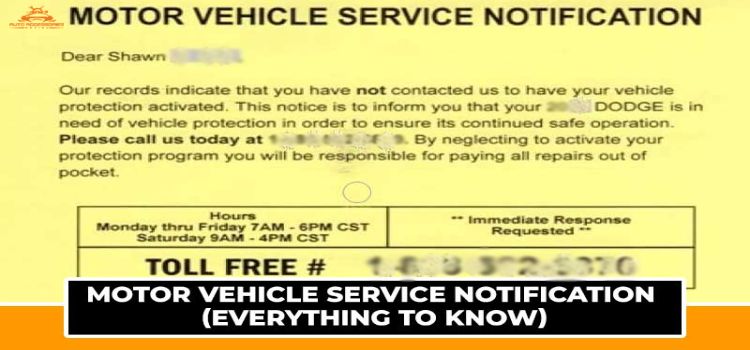Every year, scammers take more than a few million dollars from unsuspecting clients, and a majority of them are warranty-related. Nowadays, both the number of scammers and the topic “Motor Vehicle Service Notification” are getting a lot of attention.
Today we’ll explore the notion and break it down so you can easily understand what’s going on and how to protect yourself from scammers. So without any further ad, let’s get started.
Motor Vehicle Service Notification
What Is It?
In case you buy a new car, it most probably will come with a manufacturer’s warranty which covers major repairs to the vehicle for years to come. Once that warranty period is over, you’ll need to fix your car out of your own pocket.
Car repairs can be expensive, especially if you own a rare one. There are some companies that sell extended warranties to car users. They collect the info from various sources and contact the owner, most probably by mail (an unsolicited postcard or letter) or over the phone.
This proposal is commonly known as the “Motor vehicle service notification”. There are legit companies that will provide additional warranty to your vehicle. However, there are also a lot of scammers out there who actively try to scam people and take their money.
So how do you know which one is fake? How do you identify the scam from the real deal? Do you actually need an extended warranty? Let’s find out
Is It a Scam
In most cases, yeah. The scammers target mainly those who buy used vehicles. They keep sending you unsolicited messages, E-mails, or calls telling you that your car’s warranty is about to expire soon; and that you need to contact them ASAP to get that additional coverage.
Once you sign up, the provider can cut you off and you’ll lose a bunch of money with no real benefits. Even legit extended warranties are beneficial for only special cases, which I will discuss in a short while.
How the Scam Works
Scam calls are at an all-time high in the USA. In October 2019, the American people received over 2 thousand unsolicited messages just over the phone, around half of them were scams. Around $105.1 Million were lost in warranty-related scams.
Let’s break the scam down. First of all, the warranty won’t cover the repair your car needs right now. Once you make a deal, they will start the coverage and no prior damage will be under the contract. That means they are not saving you money on repairs.
This is how robotic scam calls work in general:
Additionally, many of them try to appear to the client as a car dealership organization. Once they gain your trust, they will give you an estimation and you’ll have to pay a large amount of money to get the coverage. Sometimes, the coverage amount even crosses the actual price of the car.
What’s more? The extended warranty won’t cover most repairs that you agreed upon at the time of purchasing. They will offer even lesser value than what is written on the contract. And you find them in your hour of need.
Your provider may change the phone number and vanish overnight, leaving you in a really sticky situation. Now the bigger question is, how do you identify a fake motor vehicle service notification? Let’s go step-by-step.
Is It a Postcard or a Letter
Today, most motor vehicle service notifications are sent by mail in the form of a postcard or a letter. That way, it’s easier to trick people into thinking that the notification came from a legit company or govt. organization.
To unsuspecting eyes, the letter will look like official documents. Sometimes the scammer can even provide the Department of Motor Vehicles logo or official state seals. There will be a toll-free number or other ways to contact them.

They can also reach you through Emails, text messages, or direct calls. Even if the company is legal, unless you own a rare and expensive car, “Extended Warranties” won’t serve you any good. Wanna know how? Let’s dive deeper.
Signs Your Motor Vehicle Service Notification Is a Scam

1. The timing isn’t right
Most scammers use bulk leads to call over an autodialer/Robo dialer. They can make more than 1000 calls in a day. That’s a lot of information and it’s really easy to mess up.
If you ever notice any mismatching in the notification that came and your actual manufacturer’s warranty, that most probably is a scam. Each car’s warranty depends on its age/mileage. If you still have a long way before expiration, don’t even think about getting one.
2. Lack of information
Unlike the scammers, A legit company won’t mind you finding out information about them. That’s why you’ll find no lack in any information. Scams usually hide the company name and the price of your vehicle or use a more generic response to you.
If the letter doesn’t contain your first/last name, company name, engine number, or any other necessary information, it’s most likely a scam in progress.
3. Info mismatch
Most of the time, scammers want to make you confused and insecure. They will tell you that your car is dying and they are from your car manufacturer. Even if they provide info, the info is most likely to be wrong.
If you notice any kind of mismatch between the manufacturer and the people contacting you. Move out of that situation as soon as possible.
4. Pushy agents
Most scams work by manipulating just 2 things: greed and fear. Either they will try to manipulate with greed (like you’ve won a million dollars) or fear (get an extended warranty or else…).
If you feel the agent is pushing you to make the purchase, just hang up the call. The only people these agents are helping are themselves by tricking you into spending on a worthless contract.
5. Lack of clarity
Some scammers might even be able to mimic the original manufacturer to some extent. But they will still make you confused. For example, you live in Texas whereas your manufacturer is from Ohio. In that case, the scammers will contact you through an Ohio address.
However, there will still be a noticeable lack of clarity. You’ll find information that won’t match your particular case. That’s another way to avoid spam messages and calls.
6. Over exaggeration
The scam agent will also try to establish a sense of fear in your head. The most common tactics are to exaggerate the future repair cost or the condition your car is in.
They can even say that the insurance/warranty is required by your finance company. Don’t believe everything a stranger tells you over the phone. Do a little research and you’ll be able to identify these scams much more easily.
Is It Necessary to Buy a New Service Contract
Service contracts are insurances that depend on a variety of things like your car’s condition, your driving style, the maintenance quality, and many more.
If your car is in good health and you maintain your car well, there isn’t anything much you’re going to get from a new service contract. In most cases, buying a new service contract isn’t necessary at all.
Here, car expert Shari Prymak explains why you shouldn’t buy a new service contract:
When should you actually get one?
If you have a rare and trusted car from reputed brands (like BMW or Mustang), the repairs can cost you a fortune. Only in those cases having a service contract will give you some benefits.
According to Dave Ramsey from The Ramsey Show, roughly 12% of the money people end up paying for an extended warranty goes to actual repairs. You are paying almost 8 times more money to receive a repair service.
So, It is not necessary to buy a new service contract if you don’t have a luxury/posh car.
Tips to Avoid Vehicle Warranty Scams
1. Know that the warranty is not essential
As mentioned above, you don’t need an expensive extended vehicle warranty. If you maintain your car properly and drive safely, your car should outperform the warranty’s time frame. Even if you need repairs, the cost should be minimal in most cases.
2. Don’t provide personal information
There is no free lunch. If you get the free product, chances are you’ll end up being the real product. Many free offers and exclusive deals offer free facilities in terms of your personal information like your number, address, and email.
This info can end up in the scammer’s hand and it’ll be easier for them to reach you.
3. Check your paperwork
Always check your paperwork and user manual thoroughly. That way, you’ll have a clear picture of what you’ve got. It would be really easy to manipulate you if you don’t know when exactly your warranty is going to be void.
4. Be a bit skeptical
If something sounds too good to be true, it most probably is. Being a bit skeptical and questioning around can lead you in the right direction. Remember, for every $100 you spend under a warranty, the provider can get around 90% of it.
5. Check and verify
The biggest weapon against any scammer is to check and verify the information they are providing. Being a bit skeptical and checking/verifying will help you unmask the lies and help you to get to the actual truth.
FAQs
1. What is motor vehicle protection?
Ans: Also known as motor legal protection, motor vehicle protection is an insurance add-on that can cover your payments for damages caused by unfortunate accidents, where it wasn’t your fault. They usually cover driver/passenger injury and damage to personal possession.
2. How do warranty companies get my information?
Ans: Warranty companies usually pull all the information on you and your vehicle from publicly accessible data collected throughout the internet. They create a complete client profile with all that data before contacting you.
3. How do I stop car warranty calls?
Ans: As per the Federal Communications Commission’s (FCC) policy, every phone carrier has to add robocall/scam call blockers by default. You just have to note down the phone number and block it using the phone carrier’s blocking tools.










Leave a Comment